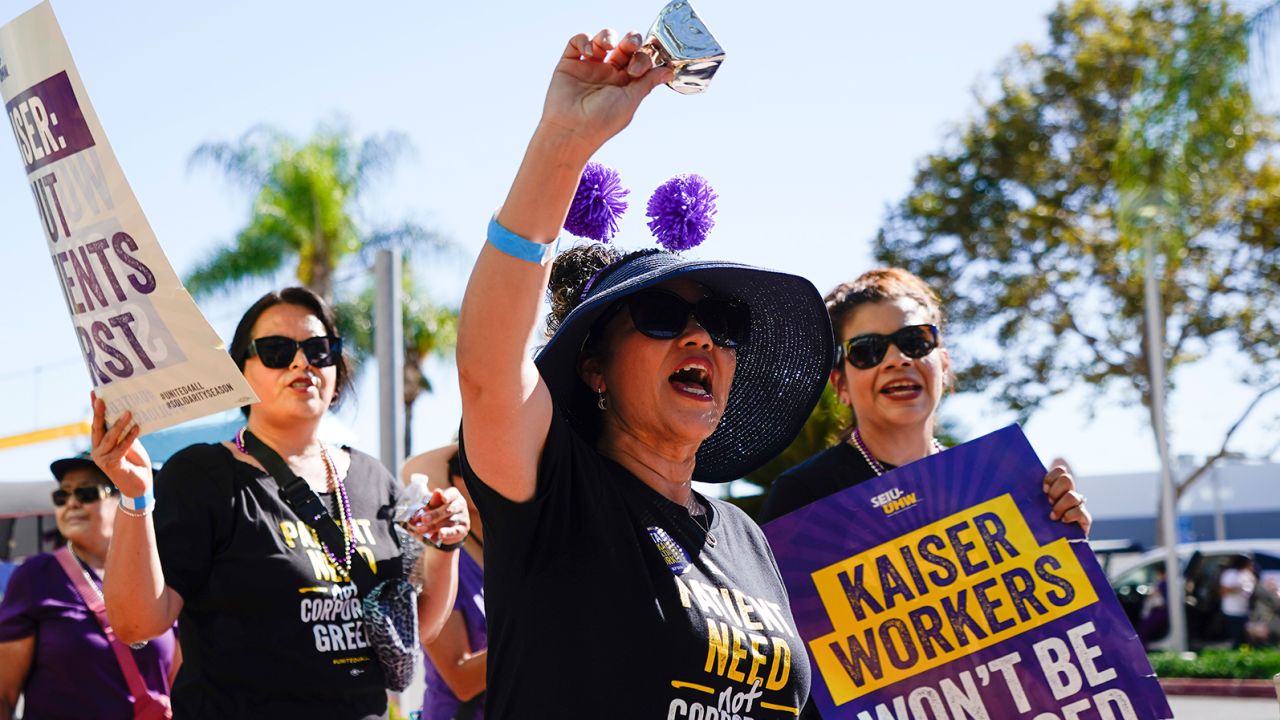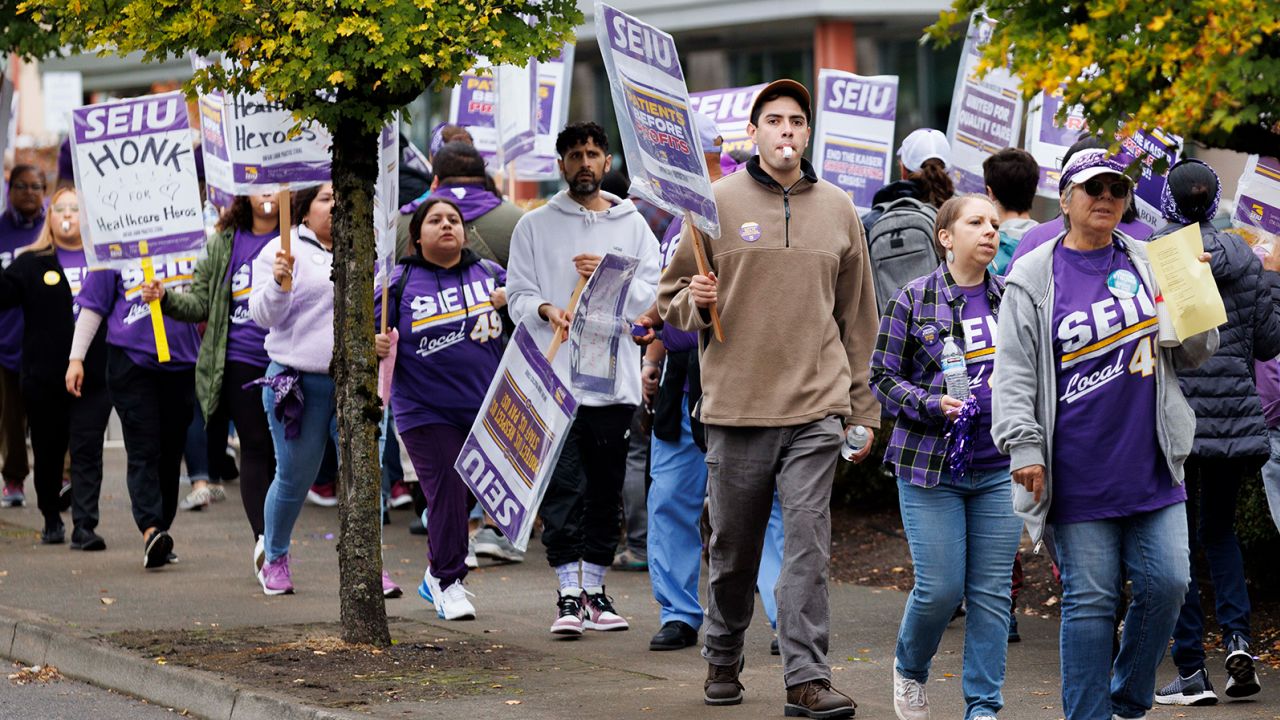CNN
—
More than 75,000 unionized Kaiser Permanente employees are returning to work after a historic three-day strike. But an even bigger, longer work stoppage could be just around the corner.
This week’s temporary work stoppage — the largest health care strike in US history — concluded at 6 am PT on Saturday without a deal.
A spokesperson for the coalition of unions representing a broad spectrum of Kaiser Permanente employees, including receptionists, dietary workers, nursing staff, pharmacists, and clinical lab scientists, told CNN that strikes may resume later if a deal is not reached. The union confirmed to CNN that negotiations will resume Thursday.
“Following this historic work action by tens of thousands of frontline healthcare workers in response to unfair labor practices by Kaiser executives, we are hopeful that the company will refrain from any further violations of federal labor laws as we resume formal talks on Thursday,” Georgette Bradford, a Sacramento, California-based Kaiser ultrasound technician and union member, said in a statement issued late Friday by the coalition. “Frontline healthcare workers remain ready to continue taking the necessary steps to protect our patients from the dangers of the Kaiser short staffing crisis and to defend our rights.”
Acting Labor Secretary Julie Su, who traveled to California earlier this week to meet with both parties, will be on hand for Thursday’s negotiations, the Labor Department told CNN in a statement.
Su “will be present to assist the parties in advancing talks towards a fair contract for this critical workforce,” according to the statement. “As [President Joe Biden] and the acting secretary have said, collective bargaining works, even when it takes time. We are glad to see the parties going back to the bargaining table.”
Last week, Biden became the first sitting president to join a picket line when he visited striking United Auto Workers members in Michigan.
Although the unions and Kaiser have scheduled bargaining sessions for the end of next week, the coalition of unions said it could issue a 10-day warning after Saturday that could kick off another round of strikes in a couple weeks “if Kaiser executives continue to commit unfair labor practices and bargain in bad faith.”
Service Employees International Union-United Healthcare Workers West union (SEIU-UHW) the largest union in the coalition, has also promised a “longer, stronger” strike when an employment contract for additional workers in Washington state expires on October 31. The union hasn’t shared specific details about a strike, though.
The looming threat of an additional work stoppage comes at a time of intensifying strike activity across the United States, with tens of thousands of workers across multiple industries taking to picket lines for better pay and benefits. In the wake of the pandemic, health care workers, in particular, have been fighting for safer work environments. This week’s work stoppage was the first-ever national strike effort at Kaiser Permanente, one of the nation’s largest nonprofit health plans.
“We are pleased to welcome back our employees who participated in this week’s strike,” Kaiser Permanente said in a statement issued Saturday. “With the current strike behind us as of 6 am Saturday, our collective focus is a return to normal operations. That will be different in differing locations. Our members can find out the hours of operation of facilities near them by visiting our website, KP.org. We are deeply appreciative of our members for their patience for the last three days.”
Where do negotiations between Kaiser Permanente and the unions stand?
The strike took place across California, Colorado, Washington and Oregon. Nearly 200 employees from Kaiser Permanente facilities in Virginia and Washington, DC, also went on strike for one day on Wednesday.
At issue, the Kaiser Permanente coalition of unions said, are concerns, exacerbated by the pandemic, related to “unsafe” staffing levels and pay that hasn’t kept up with skyrocketing rent and gas prices.
Rocio Chacon, a striking Kaiser worker on the union’s negotiating committee, told CNN that many employees cannot afford to live in the cities where they work due to the rising cost of living, and some workers resort to sleeping in their cars.
“As we speak, there are nurses that are sleeping in their cars because of two reasons. One, they can’t afford the cost of living here, so they have to move two, three hours (away), and then because of short staff, they’re working 14, 16 hours, so they’re tired,” Chacon said on Wednesday, the first day of the strike. “So, their best choice is to be Monday through Friday in their cars.”
Kaiser Permanente has argued it is a leader in pay. During the ongoing contract negotiations, the company has discussed with union employees across-the-board wage increases, including possible raises between 3% and 4% in the next four years. The coalition has instead asked for roughly a 6.5% increase in the first two years of a contract and a 5.75% increase in the final two years.

The coalition has argued that wage increases will help Kaiser attract new staff to tackle a “dangerous” labor shortage.
James Bell, a radiology technologist, described patients getting out of bed after waiting too long to get help from the limited staff on duty, resulting in falls. Some of those patients have come to him for X-rays for those injuries, he told CNN.
Kaiser said it has agreed to do “aggressive work” to hire more staff members and said it has hired 10,086 people in union-represented jobs so far this year. Some picketers have cautioned that a portion of those hires were internal employees who shifted roles.
Unlike traditional health care providers in the United States, Kaiser operates as an insurance plan and a provider of all care covered by that plan. Patients (or their employers) pay a membership fee to Kaiser Permanente to access its services.
Although Kaiser made contingency plans for the strike, some members and their families told CNN their care was affected.
Christina Campbell brings her mother, a cancer patient, into a Kaiser facility in Los Angeles on Tuesdays and Thursdays for lab work. She was turned away when she and her mother arrived on October 5.
“There’s nobody at the reception desks,” Campbell told CNN on Thursday. “This is just wrong. This is wrong on all levels. I feel bad for the nurses, but I feel worse for the patients.”
Other patients told CNN they ran into issues getting booster shots and scheduling appointments during the strike.
Larriesha Malbrough said she apologized to Kaiser employees as she entered the emergency room for treatment and felt guilty about crossing a picket line.

“You want to try to respect that, but at the same time, you’re in an emergency situation, so you have to choose also your health,” she said. “I cried when I walked into the threshold of the hospital. I teared up, and I cried. I felt bad, and I even told the personnel there, ‘I’m so sorry, I’m so sorry.’”
A more prolonged strike would likely impact patient care further, said John August, the former executive director of the Coalition of Kaiser Permanente Unions.
To be sure, staffing issues do not only affect Kaiser Permanente. Nursing shortages and demanding work conditions have created a surge in strikes and union organizing efforts, Sal Rosselli, president of the National Union of Healthcare Workers, told CNN in January.
“They learned during the pandemic that their employer was not worried about their safety, or the safety of their patients,” Rosselli said.
ECRI, an independent health care research firm, ranks the industry’s staffing shortage as the most significant risk to American patients.
Gerald Kominski, a senior fellow at the UCLA Center for Health Policy Research, said he believes the health care industry and its workers have yet to rebound from the pandemic.
“The fact that there’s burnout and problems with retention and recruiting because of the work environment is, in my opinion, probably one of the longer-term consequences of the pandemic,” he said.
This story has been updated with additional information.